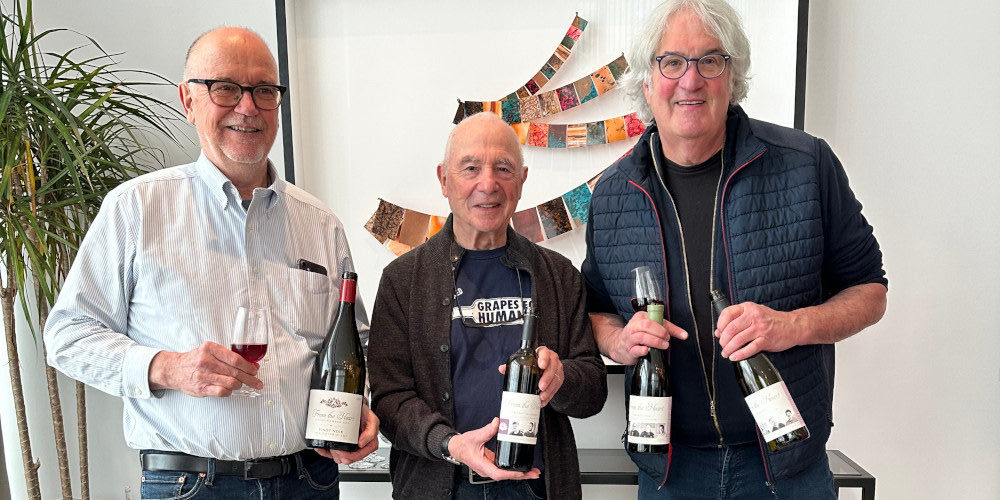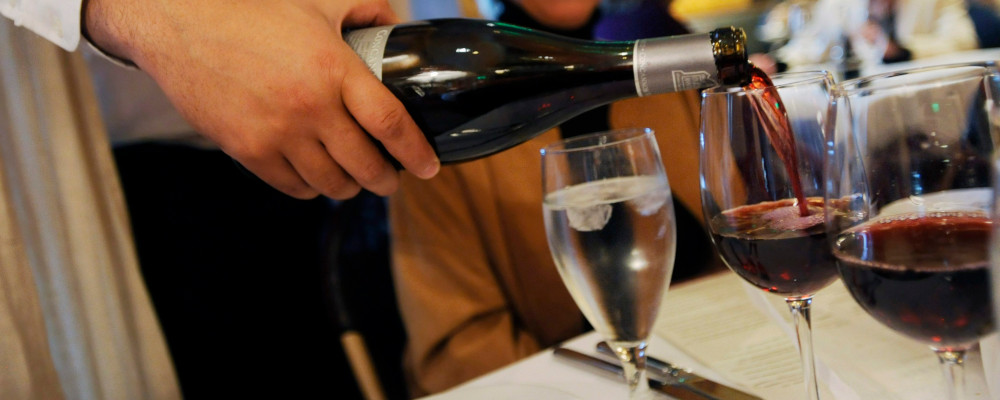Niagara winemaker Thomas Bachelder may be best known for his single-site bottling, like the Toussaints project of single vineyard Pinot Noir and Chardonnay. But of course, he also blends parcels for his Les Villages series of wines. What he doesn’t usually do, and what he’s done for a particular “MicroLot” series of Ontario wines, is blend people.
The people are 19 winemakers, who at Bachelder’s behest are combining forces to make collaborative wines (in extremely limited quantities) for the 2024 charity wine auction to benefit Grapes For Humanity. They include some old hands like, Charles Baker, Emma Garner, Kelly Mason, Shiraz Mottier, and Anne Sperling, as well as young Turks like Mackenzie Brisbois (Trail Estates), Gabriel Demarco (Cave Spring), Elisa Mazzei (Malivoire), Jessica Otting (Tawse), and Matt Smith (Cloudsley). As well as vignerons from BC and Nova Scotia.
Bachelder permutated and combined the Ontario winemakers into six supergroups to make six distinct micro lots under the label From The Heart. They include: Pinot Noir (2022, Twenty Mile Bench), Gamay (2023, Four Mile Bench), Cabernet Sauvignon (2022, Niagara-on-the-Lake), Chardonnay (2022, Niagara Peninsula), a “Red Blend” of Malbec and Cabernet Franc (NV, Ontario VQA), and Riesling (2023, Niagara Peninsula).

Last Friday, when bids opened at the online auction, Grapes For Humanity hosted a tasting of these wines with Bachelder and his most of his merry crew from Ontario at hand. The wines showed well, and with only 10 cases made of each, are already collector’s items. Bachelder explained that since the auction included Grand Cru wines from historically significant regions like Bordeaux, Burgundy, and Barolo, he felt that combining efforts from the best products of some of Canada’s best winemakers might even the field.
Tasting through the wines and talking to the winemakers, I learned that sometimes the blend in the From The Heart bottle comes from a number of different vineyards. For instance, the Pinot Noir collaboration between Bachelder and Kelly Mason includes wines made from fruit from Mason’s own estate vineyard, Bachelder’s allotment at the Wismer-Parker vineyard, and the legendary Clos Jordanne vineyard, where Bachelder provides his services.
Other times, as in the Gamay co-ordinated by Mottiar at Malivoire, the blend includes wines made from different rows at a single site (the Creek Road Vineyard) made by his colleague Mazzei, Jeff Moote (divergence), and Jessica Polanski (Liebling), whose family owns the plot of land.
Anne Sperling’s women’s winemaking team, which includes Mason and Otting, didn’t just blend wines from Lailey, Queylus, and Tawse properties, they blended from different years, so their Malbec and Cabernet Franc microlot is non-vintage. When I asked her about the process, Sperling spoke frankly about the challenges of collaboration. It wasn’t just the terroirs or the vintages of the wines that had to find the best harmony, but also the personality and style of the winemakers themselves.
Cuvée from the Heart began in 2019 when Grapes for Humanity board member and wine trade veteran Steven Campbell called Bachelder to ask if he could donate a barrel of wine to their annual auction which raises funds for a combination of landmine (Halo Trust) and environmental charities (Tree Canada and The Nature Conservancy of Canada). “He refused,” Campbell explained, “then he said he’d give us two”.
Bachelder matched his two barrels of Chardonnay and Pinot Noir with others he and Campbell solicited from other winemakers, drawing on the best sites in Niagara. There are now three vintages of the original red and white Cuvées (which is French for blend): 2019, 2020, and 2021. Lots of all six, in magnum, are also part of this year’s auction.

When I spoke with Sperling, she emphasized that everything that went into the Cuvée from the Heart bottles was donated. Not just the juice and the winemaker’s time, but everything from the barrels and equipment, transportation, bottling, auction fees from Waddington’s, storage fees from Dymon wine cellars, where the event took place, to taxes—you name it, it has been covered so that every dollar raised goes to Grapes for Humanity Canada and the charities they support.
Environmental issues are particularly dear to Campbell’s heart. Before he sold one of Canada’s most successful wine agencies in 2020, he oversaw Lifford’s conversion to a completely carbon-neutral company. At the same time, he created the first line of carbon-neutral wines, Campbell’s Kind Wines, recruiting winemakers from across six different countries and was awarded an honorary doctorate from York University for his efforts.
“Our wine community is hurting from climate change,” Campbell said addressing the few dozen winemakers and journalists assembled. He made specific reference to Okanagan producers who face losses of up to 90 percent of the 2024 harvest because of chaotic cold weather earlier this year. “As citizens,” he added, “we need to think of long-term solutions.”
Nicole Hurtubise, CEO of Tree Canada, was at the tasting to remind us that in 2023, Canada lost over 18 million hectares of trees due to forest fires. Her organization plants trees in communities as well as in the course of reforestation projects. Last year they did their best to counter the loss by planting over 2 million trees from coast to coast to coast.
Also on hand was Grapes for Humanity co-founder, the author and journalist Tony Aspler. Aspler created the non-profit in 2000 with Arlene Willis, whose brother was killed by stepping on a landmine in Vietnam in 1968. While Aspler said he was glad that Grapes For Humanity had kept its connection to clearing landmines by supporting the Halo Trust, he saw climate change as one of the great modern challenges to humanity.
Bachelder wrapped things up by reminding the group that Aspler had written about Canadian wines long before they garnered much interest, let alone respect, and the superlative quality of the wines in the room has much to owe to pioneers like him who saw potential in an emerging region. Campbell agreed that the Canadian wine community stood on the shoulders of giants, but added, raising a glass of something red, that the future looked bright too. Then, he told everyone to try and bid up the wines at auction before it closes on Monday, April 22nd—Earth Day.




